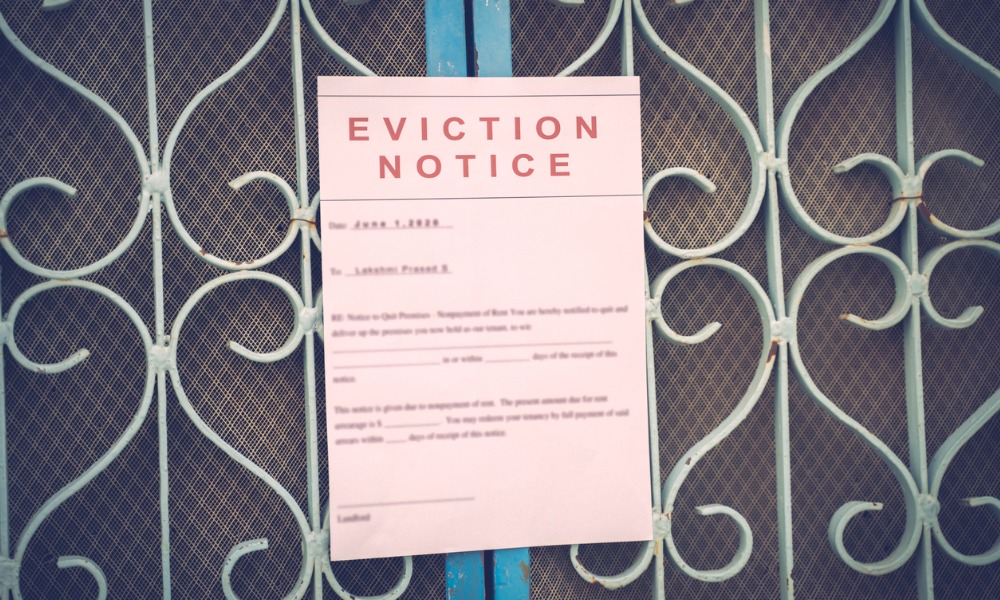Landlords and tenants clash amid continuing affordability woes

As housing costs soar, landlords in Ontario are increasingly using "own-use" evictions to reclaim rental units, leaving tenants scrambling to find new homes.
Own-use evictions in Ontario have increased by 85% since 2020, according to data from the Landlord and Tenant Board.
The number of own-use eviction applications—known as N12 notices—filed with the Ontario Landlord and Tenant Board has climbed from 3,445 in 2020 to 6,376 in 2023. These applications allow landlords to evict tenants if they or a family member plan to occupy the unit.
The number of T5 applications, where tenants dispute the eviction claim after vacating, has also risen sharply, from 331 in 2020 to 1,335 in 2023.
Tenants fight back
Chris Kostav and Shari Keyes, tenants in a low-rise building in East York, Toronto, are among those facing evictions. Their landlord has filed N12 eviction notices, claiming he needs the units for his family members.
Kostav, a retired electrician who has lived in his studio unit for nearly 20 years, suspects the true motive is to re-rent the unit at a higher price.
"I think the only reason he wants me to leave is so he can charge higher rent," Kostav, who currently pays $600 per month, told CBC. He fears becoming homeless if forced out, as his pension won't cover the increased rent costs.
Keyes, 56, fought her eviction and recently won a ruling from the Ontario Landlord and Tenant Board that her landlord had acted in bad faith, allowing her to stay.
"The rents everywhere are so high we knew we couldn't afford anything else. We had to fight because we've been worried about the possibility of homelessness this entire time," she told CBC News.
Their landlord, Sofiene Bousselmi, denied acting in bad faith, insisting that he needs the units for family members.
The conflict reflects wider tensions in a market where average rents have surged 22% in two years. According to Rentals.ca, the national average for a one-bedroom apartment is now $1,929.
Karly Wilson, a housing lawyer in Toronto, noted that many tenants are fighting to stay in their homes despite challenging conditions.
"People are clinging to their homes with their fingernails like they are. They're desperately clawing to stay in their apartment, even if that apartment is terrible," Wilson said. "I tell my tenants if they've been anywhere for more than five years, they have a target on their back.
"Tenants will refuse to leave an apartment for years because they know they have nowhere to go."
Landlords denies bad faith
Landlords, however, argue that their need to repossess properties is genuine, often citing rising costs and mortgage rates.
Rose Marie, vice-chair of landlord advocacy group Small Ownership Landlords of Ontario (SOLO), explained, "If you have to pay $800 a month for your rental property, and then your mortgage needs to be renewed for your principal residence and you have to pay another $600 or $800 for that, you can't afford it.
"You can't just pass that monthly increase over to the tenant. So then who's paying it?"
Jessica Huang, a landlord who joined a recent protest at Queen's Park, expressed frustration with the delays in processing eviction cases.
"I'm a single mom, and I can't afford to keep paying for a rental property I no longer live in. I need to move back in, but the process is taking forever," Huang said.
Read next: New BC eviction rules might worsen housing affordability crisis, say industry groups
Huang, like many small landlords, is caught between rising costs and the legal complexities of evicting tenants.
The Landlord and Tenant Board reported a quadrupling of T5 applications – filed by tenants disputing own-use claims after vacating - from 331 in 2020 to 1,335 in 2023.
Fines for bad faith evictions more than doubled from 11 in 2022 to 23 in 2023.
Wilson pointed out the challenges tenants face in disputing these claims.
"It's an easy way to get somebody evicted, honestly. An N12 doesn't have a high burden of proof. It just requires one person saying: 'I want to move into this unit.' And unless you can prove that they're lying about that, which is hard, you kind of have to go with it," Wilson said.
Make sure to get all the latest news to your inbox on Canada’s mortgage and housing markets by signing up for our free daily newsletter here.



